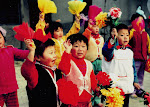 |
| A Chinese mom-to-be's preparation for baby. |
We received joyous news last week. A young Chinese woman I have known for almost 20 years gave birth to her first baby, a healthy boy, in Shanghai.
I first met the new mother when she was 12 years old; her parents asked me to tutor her in American English. She turned 30 years old just three weeks ago. We kept in touch over the years, seeing her and her family whenever we visited China. She's been to the United States twice to visit us.
Having a baby in China is a lot different than having a baby in the United States. For one thing, her husband says new fathers pass out hard boiled eggs to celebrate the baby's birth. This is much healthier than passing out cigars like new fathers do here, don't you think?
Another way having a baby in China is different is the red tape involved. Because
I'm not sure I understand all that is involved in hukou, but it's like a permanent residency system. Even though our friends went to university in Shanghai, have lived there ever since and bought an apartment there, they are still considered temporary Shanghai residents. From what I understand, changing one's hukou is a process that takes many years, not something they could do in nine months. She still could have had the baby without this permission, but she would not have been able to have it in a hospital, and would get no official papers for the child, which meant he could never attend school or hold a decent job.
She is hukou for Beijing, and that's where she was finally able to get permission to have the baby.
The next step was getting accepted at a hospital that would provide the prenatal care and handle the birth. The application process included a personal interview. She was accepted at the second largest maternity hospital in Shanghai, which was her first choice because it is the closest to their home.
Modern Chinese mothers are breaking with tradition of returning to their parents' home for a few months while they recuperate from the birth and learn how to care for the infant. Modern parents are more mobile than their parents, and may live thousands of miles away, so many new mothers today opt to hire a nurse for the first month, according to a recent article in China Daily. Our friend had her nurse lined up several months ago and already has a babysitter lined up for when her maternity leave is over and she returns to work.
Are you going to China?
If a trip to China is in your plans, check out Cheryl's China, and feel free to email me with any questions you might have.




No comments:
Post a Comment